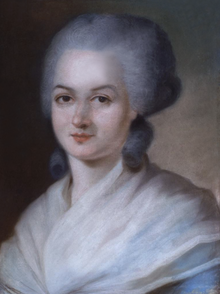Olympe de Gouges | |
|---|---|
 Portrait by Alexander Kucharsky | |
| Born | Marie Gouze 7 May 1748 Montauban, Quercy, Kingdom of France |
| Died | 3 November 1793 (aged 45) |
| Cause of death | Execution by guillotine |
| Occupations |
|
| Spouse |
Louis Aubry
(m. 1765; died 1766) |
| Children | 1 |
| Signature | |
Olympe de Gouges (French: [ɔlɛ̃p də ɡuʒ] ; born Marie Gouze; 7 May 1748 – 3 November 1793) was a French playwright and political activist. She is best known for her Declaration of the Rights of Woman and of the Female Citizen and other writings on women's rights and abolitionism.
Born in southwestern France, de Gouges began her prolific career as a playwright in Paris in the 1780s. A passionate advocate of human rights, she was one of France's earliest public opponents of slavery. Her plays and pamphlets spanned a wide variety of issues including divorce and marriage, children's rights, unemployment and social security. In addition to her being a playwright and political activist, she was also a small time actress prior to the Revolution.[1] De Gouges welcomed the outbreak of the French Revolution but soon became disenchanted when equal rights were not extended to women. In 1791, in response to the 1789 Declaration of the Rights of Man and of the Citizen, de Gouges published her Declaration of the Rights of Woman and of the Female Citizen, in which she challenged the practice of male authority and advocated for equal rights for women.
De Gouges was associated with the moderate Girondins and opposed the execution of Louis XVI. Her increasingly vehement writings, which attacked Maximilien Robespierre's radical Montagnards and the Revolutionary government during the Reign of Terror, led to her eventual arrest and execution by guillotine in 1793.
- ^ Hunt, p. 498